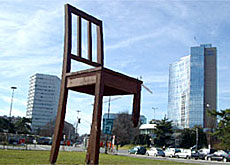Foreign law students flock to Geneva centre

A post-graduate course in international humanitarian law has proved so popular university officials have created a second class to meet demand.
After just one term, Geneva’s University Centre for International Humanitarian Law (CUDIH) is setting up a parallel programme in English.
Last year, Geneva University and the Graduate Institute of International Studies teamed up to create CUDIH, which offers a Master’s degree in International Humanitarian Law.
Classes began five months ago and already university officials say they’ve been inundated with applications for the 2003-2004 academic year, with student numbers expected to double from 30 to 60 by autumn.
Unique location
Andrea Bianchi, the co-director of CUDIH, believes the school’s attraction lies in its location, along with its unique focus on all aspects of international humanitarian law.
“Geneva is the homeland of international humanitarian law,” he told swissinfo. “I believe the centre will strongly contribute to enhancing the city’s capacity to attract more and more people who are committed to this cause.”
The dean of CUDIH’s law faculty, Andreas Auer, agrees that Geneva’s long tradition as a centre for humanitarian issues makes it an ideal city to host such an institution.
“Such a centre simply has to be in Geneva… because of its important historical role, the presence of international and non-governmental organisations and because the general public identifies international humanitarian law with the city of Geneva,” he said.
Good timing
CUDIH opened its doors just after the International Criminal Court came into being last summer and following Switzerland’s joining of the United Nations in September.
Bianchi views these two events as evidence of the growing need for international humanitarian law, in a world rife with conflict and aggression.
“It’s a time of transition and these developments strongly contribute to the advancement of international humanitarian law,” he said.
“There’s strong demand to create institutions like CUDIH, which can contribute to the development and respect of the rules of law, both in times of peace and war.”
The main obstacle was how to get individual countries to implement humanitarian law, Bianchi added.
Awareness
Auer also believes that Switzerland’s membership of the UN has raised public and political awareness of humanitarian issues and their role in foreign policy making.
“Since Switzerland joined the UN, public interest has grown a lot and it’s also an important issue for the federal government when it comes to international politics,” Auer explained.
He said recent challenges to the validity of the Geneva Conventions, in respect to terrorism, also highlighted the need for academic discussion concerning the principles of international humanitarian law.
Promising future
After a one-year course involving research projects at local organisations, Bianchi believes the centre’s graduates will be well prepared for a variety of careers within international and non-governmental organisations, as well as other fields.
“Some will teach and others will advise governments, which is important because sometimes governments lack the expertise to properly address humanitarian issues,” he said.
An Algerian student believes her degree from CUDIH will serve as a passport to many job opportunities all over the world.
“I’m really confident that there are career possibilities out there, overseas in the field and in academics, which I didn’t know about,” she says.
Classes are currently conducted in English and French and students must be fluent in both. However, an English-language programme is being prepared for people who cannot master both languages.
Distance learning
The centre is also currently exploring ways to coordinate activities with Harvard University’s Program on Humanitarian Policy and Conflict Research, which is backed by the Swiss government.
Plans are also underway to establish a distance-learning programme, which Auer hopes will allow the centre to grow and flourish in the future.
“The need and the demand is so huge that it’s not sufficient to invite 60 students to study for a year in Geneva,” he said.
“It’s important that the centre creates ways for people in other countries, who don’t have the possibility to come to Switzerland, to learn the basics of international humanitarian law.”
swissinfo, Anna Nelson in Geneva
Geneva’s University Centre for International Humanitarian Law was established in July 2002.
The student body is made up of 30 students from 10 different nations, who are all required to have a basic law degree.
Switzerland is the depositary state of the Geneva Conventions, which form the principles of international humanitarian law.

In compliance with the JTI standards
More: SWI swissinfo.ch certified by the Journalism Trust Initiative


You can find an overview of ongoing debates with our journalists here. Please join us!
If you want to start a conversation about a topic raised in this article or want to report factual errors, email us at english@swissinfo.ch.